Here is the latest exposé about Jody and the Grandmas from Sporkful (Audio Only):
The full transcript is here on Sporkful
Here is the latest exposé about Jody and the Grandmas from Sporkful (Audio Only):
The full transcript is here on Sporkful
Check out this great interview on WFUV: https://www.wfuv.org/content/nonnas-kitchen
Article Here:Â https://www.fodors.com/news/nonna-is-making-dinner-and-all-of-new-york-city-is-invited-12301
The quality and authenticity of a restaurant increase considerably when a nonna (Italian for grandmother) is working the kitchen. At Enoteca Maria, there isn’t just one nonna cooking her traditional recipes—there are two.
Enoteca Maria is a restaurant with a unique concept: every evening, one of the resident Italian nonnas and a guest nonna from a different part of the world cook their own recipes from the old country, giving diners the opportunity to enjoy nonna’s home cooking away from home.
Not many restaurants offer the promise of eating an entirely different cuisine every time you visit. The rotating menu is an opportunity to always try a new dish. Nonna wants you to live a little, life is so short!
The OG Nonna
Born and raised in Brooklyn, owner Jody Scaravella‘s tight-knit Italian family was the inspiration for the concept of the restaurant. Recognizing that his grandmother Maria was the one responsible for preserving his Italian family’s cultural and culinary traditions, Scaravella opened a restaurant that featured a rotating lineup of four Italian nonnas who would take turns cooking their time-tested dishes for the grandchildren of New York City.
Understanding that the culinary knowledge and tradition of every nonna could be lost to history, Scaravella began to compile a cookbook filled with recipes from nonnas around the world, each written in their native language. This appreciation of diversity and desire to retain generations-old knowledge spread to his restaurant, which now features a guest nonna from a different part of the world every night, making their own family’s specialties for Scaravella’s customers.
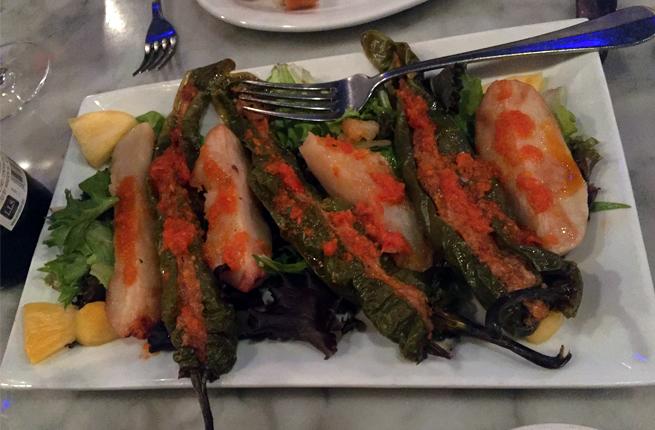
Hot Stuffed PeppersÂ
Around the World in 20 Nonnas
The Nonna d’Italia rotates between nonnas with origins throughout Italy such as Palermo, Abruzzo, Campania, Umbria, and Napoli. These nonnas prepare a menu of classic Italian dishes and specialties of their own like hot stuffed peppers or marinated octopus. The guest nonna contributes two or more options each for an appetizer, main course, and dessert. Nonna Ploumitsa serves a Greek-style lasagna called pastitsio, which is layers of pasta, ground beef, and tomato sauce baked and topped with béchamel sauce. Nonna Anna from Armenia serves up a saucy khashlama, a beef stew cooked in beer with peppers, onions, and tomatoes followed by a dessert of puff pastry served with reduced grape and walnut jam bites. Bangladeshi Nonna Muhfuza’s samosas satisfy as an appetizer before an entrée of chicken curry and pholow, a home-style dish consisting of flavorful curried chicken and basmati rice, served with a side salad and hard boiled egg. Nonna Alexandra from Sofia, Bulgaria makes banitsa, baked filo dough with eggs, yogurt, feta cheese, and butter, or bob yakhniya, big white beans simmered with onions, peppers, tomato sauce, and parsley, thyme, and mint.
For those who are curious about to learn more about their new nonna, the restaurant’s website offers short bios of each nonna written in their mother tongue.
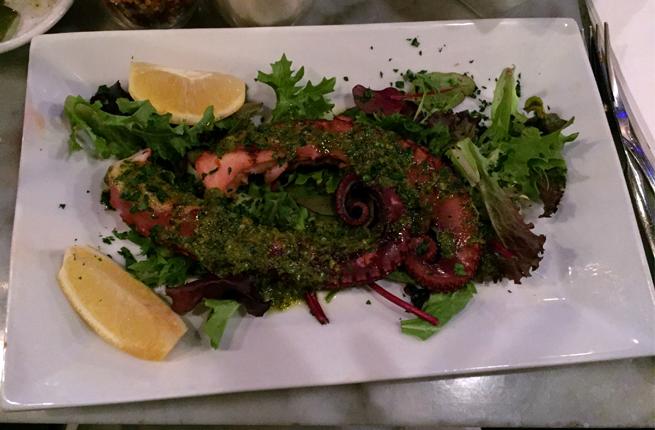
Marinated Octopus
What Is It About a Nonna?
A meal that has been prepared by the experienced hands of a nonna evokes a certain comfort that no other food can give. It is made from decades of practice without a recipe and with the additional inspiration of feeding loved ones. Although the nonnas at Enoteca Maria are still strangers to the guests they are feeding, there is a certain magic in what they do, and to find that personal touch in a New York City restaurant is rare. Now eat your pasta, you look pale!
Nonna-Style
Nonna is not necessarily on top of the latest food fads and health concerns that influence people today. It has become common to modify traditional recipes in order to satisfy health requirements or accommodate dietary restrictions. Nonnas are old school, cooking with taste and satisfaction in mind–not a trim waistline or the daily vitamin A requirement. Food made from scratch by someone who genuinely enjoys what they are creating and has had years to tweak the recipe to perfection contains healthful properties that will not be found in the pre-packaged bean sprout salad at the juice bar. Nonna would be devastated to know what you are eating these days, it’s no wonder you’re so slim, you’re wasting away, eat, eat!
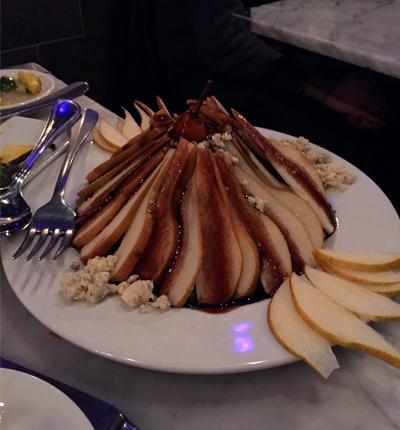
Pear Salad
Taking Care of Nonna
Anyone who has worked in a restaurant, especially in the back of the house, knows that this is no easy gig. Cooking in a restaurant is a grind, which is why the featured nonnas at Enoteca Maria only work one night a month, and the Italian nonnas rotate their schedules so they are also not working too hard. We want to keep nonna happy and healthy!
Nonna’s World
A kitchen with two nonnas at the helm could be enough to make guests feel at home, but along with the food, the dining experience is also hospitable. The restaurant is cozy, and diners can choose from a few seats at the small bar or relax at a table in the dining room. The staff is friendly and attentive, eager to answer any questions about the food or the nonnas. The guest nonna occupies the kitchen upstairs so the diners can watch her do her thing. The atmosphere is festive, welcoming a diverse crowd of New Yorkers–locals from the neighborhood, couples on a date, friends having a casual dinner, and groups celebrating a special occasion.
The Staten Island location may put people off at first, but the restaurant is only a five-minute walk from the Staten Island Ferry. The ferry service is free and departs every 30 minutes to and from Lower Manhattan. So Nonna doesn’t want to hear any excuses about why you are not visiting her.
Some people are lucky enough to have their own nonna who cooks her specialties from the old country with love, but for those who don’t, there is Enoteca Maria.
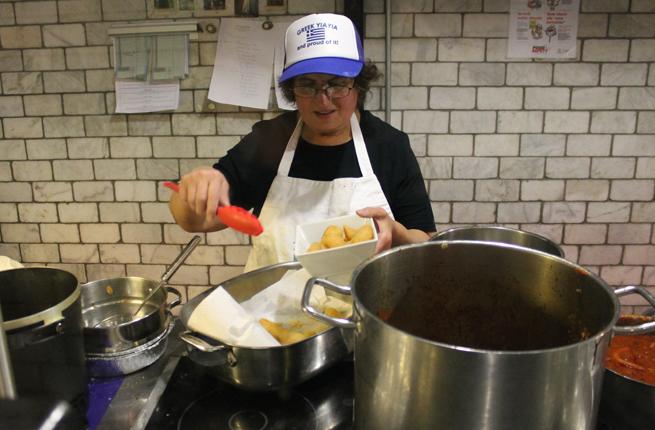
Nonna Ploumitsa at Enoteca Maria
27 Hyatt Street, Staten Island, New York 10301
Phone: (718) 447-2777
Reservations are suggested and are for a two-hour seating. Cash only.
Lunch: Wednesday through Friday from 12 pm to 3 pm.
Dinner: Wednesday through Sunday from 3 pm until close.
The Nonnas of the World gets an illustrated mention in Ripley’s Believe It or Not.
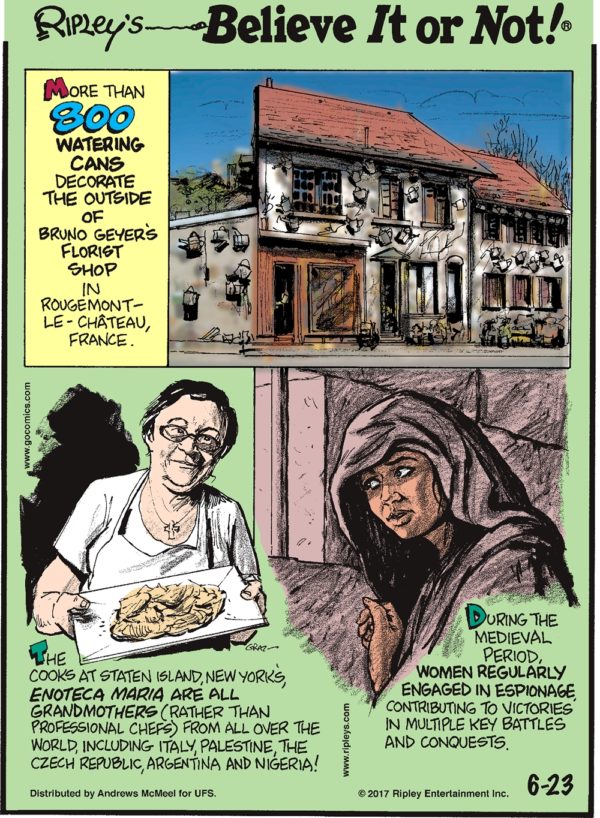
Video embedded here:
Video Here:
Full Article Here:Â https://mobile.nytimes.com/2017/03/02/nyregion/at-this-staten-island-restaurant-a-kitchen-run-by-grandmas.html?_r=0&referer=https://www.google.com/
Just inside the entrance to an Italian restaurant on a recent afternoon in the historic St. George neighborhood on Staten Island, the smell of soy and ponzu masked that of onions and garlic.
The source? A Japanese woman had taken over the kitchen to make gyoza and shrimp dumpling soup.
“The dumplings are good!†said a customer at a table of seven, sounding surprised.
The next night, however, the dumplings would not be there.
At Enoteca Maria, an “Italian†restaurant on Hyatt Street, half of the menu changes daily. The fixed half is Italian; the rest is left for rotating cuisines from all over the world. And the people calling the shots are not professional chefs; they are grandmothers.
Each night, a “nonna†(Italian for grandmother) from a different country designs a fresh menu, honoring her native cuisine.
Friday was Sri Lanka; Thursday, the Philippines; Tuesday, Armenia.
A man eating at the bar asked about the next Sunday menu: Russia.
Mary McLaughlin, 68, had cod and the gyoza. The man sitting next to her had lasagna. Ms. McLaughlin, who traveled 32 miles from Floral Park, on Long Island, to dine at the restaurant, said she liked the idea of rotating chefs who knew their way around a truly home-cooked meal.
“It’s more personal,†Ms. McLaughlin said. “And it leads to a variety of items on the menu.â€
Across the table, Terry Blair, 60, of Bellerose, also on Long Island, tried the rabbit and gyoza; her daughter ordered ravioli.
A few feet away, Brian Goldberg and Concetta Smith, of Brooklyn, went the Italian route.
“It’s very much of a New York experience,†said Mr. Goldberg, who works as a computer engineer. “It’s like a vibe.â€
Throughout their meal, Mr. Goldberg and Ms. Smith, a writer, listened as the owner, Joe Scaravella, fielded calls from behind the bar from potential diners.
“He’s been on the phone pretty much since we got here,†Ms. Smith said.
Mr. Scaravella, 61, wears glasses with tiny round lenses and thin frames — the kind a wacky inventor might wear. His thick, gray beard, poking out in all directions, defies the confines of his face. He has the mustache to match.
“Enoteca Maria, can I help you?†Mr. Scaravella said at a breakneck pace, as if it were all one word, into a headset.
“This thing is plugged into my brain,†he said, joking.
The phone rang every few minutes. One caller asked if Mr. Scaravella would hold her reservation; she was running late. Another made reservations from England.
The hoopla over Enoteca Maria is sort of a happy accident. Mr. Scaravella moved to Staten Island from Brooklyn on a whim in 2006. While scoping out local real estate, he fell in love with a storybook cottage on a hill: a century-old Dutch colonial with walnut wood inside and a scenic view.
He bought the house that day by impulse. Soon after moving in, he went on a bread run and noticed an open storefront on Hyatt Street. That is where Enoteca Maria now stands.
At the time, Mr. Scaravella had recently lost his mother. His sister and grandmother had also died.
“After losing all those matriarchal figures in my life,†he said, “I wanted to try to recreate that, you know, grandma in the kitchen cooking.â€
He had no business plan and no restaurant experience.
“I was just trying to comfort myself,†said Mr. Scaravella, who named the restaurant after his mother. At the time, he had been working for the Metropolitan Transportation Authority for over a decade. “I work from the heart more than from the head.â€
When the restaurant opened, all of the “nonnas†he hired were Italian. In July 2015, Mr. Scaravella brought in the first non-Italian cook, from Pakistan.
Though there are many great professionally trained chefs, Mr. Scaravella said, these women offered something different.
“When they cook, they’re really expressing themselves,†he said of the cooks, many of whom rely on generations-old family recipes.
“In the beginning, when we were all Italian nonnas,†he said, “there might have been a little bit of jealousy. You know, who makes the best lasagna, or who makes the best sauce?†But these days, there is little conflict, something Mr. Scaravella attributes to the diversity of the cooks. The kitchen arrangement also seems to help: A different cook each night is matched with an advocate, or a sous chef.
On a recent Saturday, the cook in training was Yumi Komatsudaira (the Japanese woman with her shrimp gyoza soup), who is from Saitama, Japan, just outside Tokyo. Although she is not a grandmother, an exception was made. Her sous chef was from Siberia.
“They can’t be jealous of each other, because they’re from two different worlds; they’re doing two different things,†he said. “The only thing they can say is: ‘Oh, how do you do that?’ ‘How does this taste?’ ‘What ingredient is that?’â€
The women share tips and tricks, Mr. Scaravella said.
“For me, it’s a more beautiful interaction,†he said of the pairing. “There’s much more of an exchange of culture and stories and recipes.â€
Ms. Komatsudaira visited Enoteca Maria in January to learn to cook Polish food. The public can sign up for free one-on-one cooking classes at the restaurant, taught by women from a variety of countries. These lessons — exclusively by and for women — are currently booked several months in advance. After Ms. Komatsudaira’s lesson, Mr. Scaravella invited her to cook her own Japanese menu.
“I love cooking; I love food,†said Ms. Komatsudaira, as she prepared seaweed from her family’s business. “I guess Joe can see right away.â€
She learned about food from her mother, and she is teaching her 11-year-old son how to cook at home. She emphasized the importance of memories made in the kitchen and around the table.
“I think eating at home is what makes you who you become,†she said.
Ms. Komatsudaira and her sous-chef and trainer prepared a carefully curated menu that included Japanese fried chicken.
Downstairs, Adelina Orazzo runs the Italian kitchen. Ms. Orazzo, 61, who moved to Brooklyn from Naples, Italy, 25 years earlier, is “very proprietary about her knowledge,†Mr. Scarvella said.
When she was a child, her family was very poor, Mr. Scaravella said of Ms. Orazzo, whose English is limited. Her uncle would paint the floor of the house to make it look tiled. Mr. Scaravella attributes her cooking knowledge to her upbringing. She cooks Old World dishes like sheep’s head; she makes stuffing from ingredients normally thrown to the side — chicken livers and hearts and gizzards.
“These are poverty-driven dishes,†he said. “I really like to keep these as simple and as authentic as possible, because they really represent… it’s really the origin of food.â€
Aside from Ms. Orazzo, each of the cooks comes in one day a month to help with the daily specials, which makes for a unique energy in the kitchen, he said.
There is a distinct difference between a grandmother’s homey kitchen and the nonnas enterprise: A grandmother never turns anyone away.
At Enoteca Maria, however, Mr. Scaravella doesn’t have much choice.
“We are completely booked,†he said into the headset, over and over. “I can put your name on a wait-list and call you, if something changes.â€